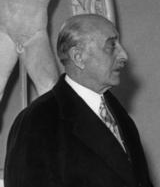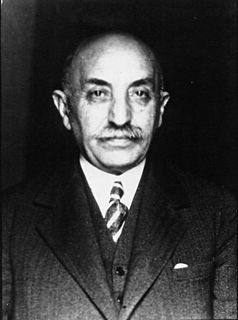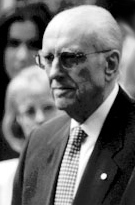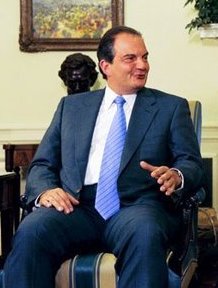Conservatism is a political and social philosophy promoting traditional social institutions in the context of culture and civilization. The central tenets of conservatism include tradition, human imperfection, hierarchy, authority, and property rights. Conservatives seek to preserve a range of institutions such as monarchy, religion, parliamentary government, and property rights, with the aim of emphasizing social stability and continuity. The more extreme elements—reactionaries—oppose modernism and seek a return to "the way things were".

Konstantinos G. Karamanlis, commonly anglicised to Constantine Karamanlis or just Caramanlis, was a four-time Prime Minister and twice President of the Third Hellenic Republic, and a towering figure of Greek politics whose political career spanned much of the latter half of the 20th century.
Georgios Ioannou Rallis, anglicised to George Rallis, was a Greek conservative politician and Prime Minister of Greece from 1980 to 1981.

Stefanos Stefanopoulos was a Greek politician, and served as Prime Minister of Greece from 1965 to 1966.

Spyridon Markezinis or Markesinis was a Greek politician, longtime member of the Hellenic Parliament, and briefly the 169th Prime Minister of Greece during the aborted attempt at democratization of the Greek military regime in 1973.

Konstantinos Tsaldaris was a Greek politician and twice Prime Minister of Greece.

Alexandros Papagos was a Greek Army officer who led the Hellenic Army in World War II and the later stages of the Greek Civil War. The only Greek career officer to be raised to the rank of Field Marshal, he became the first Chief of the Hellenic National Defence General Staff from 1950 until his resignation in 1951. He then entered politics, founding the Greek Rally party and becoming the country's Prime Minister after his victory in the 1952 elections. His premiership was defined by several events. The Cold War, and the aftermath of the Greek Civil War; Greece becoming a member of NATO; American military bases were allowed on Greek territory; a powerful and vehemently anti-communist security apparatus was created; and the communist leader Nikos Ploumpidis was executed by firing squad. His tenure also saw the start of the Greek economic miracle, and rising tensions with Britain and Turkey over the Cyprus issue.
The People's Party was a conservative and pro-monarchist Greek political party founded by Dimitrios Gounaris, the main political rival of Eleftherios Venizelos and his Liberal Party. The party existed from 1920 until 1958.

Parliamentary elections were held in Greece on 19 February 1956. The result was a victory for Constantine Karamanlis and his National Radical Union party by securing the electoral vote despite trailing in the popular vote. It was the first general election in Greece in which women had the right to vote, although women had first voted in a by-election in Thessaloniki Prefecture in 1953 in which the first female MP was elected.

Parliamentary elections were held in Greece on 9 September 1951. They resulted in an ambivalent outcome, consisting a narrow and pyrrhic, as proven later, victory for the ruling center-liberal parties of Sophoklis Venizelos and Nikolaos Plastiras.

Panagis Tsaldaris was a Greek politician and the 48th Prime Minister of Greece. He was a revered conservative politician and leader for many years (1922–1936) of the conservative People's Party in the period before World War II. He was the husband of Lina Tsaldari, a Greek suffragist, member of Parliament, and the Minister for Social Welfare.

The European Parliament election of 1994 in Greece for the election of the delegation from Greece to the European Parliament took place on June 12. The election system used in Greece was a party-list proportional representation with a 3% threshold for any party. The number of seats allocated to Greece was 25.

The European Parliament election of 1999 in Greece for the election of the delegation from Greece to the European Parliament took place on June 13. The election system used in Greece was a party-list proportional representation with a 3% threshold for any party. The number of seats allocated to Greece was 25.
The National Progressive Center Union was a Greek political party.

The European Parliament election of 1989 in Greece for the election of the delegation from Greece to the European Parliament took place on June 15. The election system used in Greece was a party-list proportional representation. The number of seats allocated to Greece was 24.

Thrasyvoulos Tsakalotos was a distinguished Greek army Lieutenant General who served in World War I, the Greco-Turkish War of 1919–1922, World War II and the Greek Civil War, rising to become Chief of the Hellenic Army General Staff. He also served as Greece's Ambassador to Yugoslavia.

The Independent Greeks - National Patriotic Alliance is a conservative, national-conservative, right-wing populist political party in Greece. The party won 10 seats in the September 2015 parliamentary election and agreed to renew its coalition government with the Coalition of the Radical Left (SYRIZA).
New Party is a former Greek conservative political party founded in 1947 by Spyros Markezinis. The party was formed after Spyros Markezinis broke away from the People's Party. 18 MPs joined the newformed party, mainly from the People's Party.














